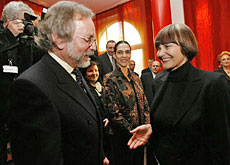EU prepares tax complaint against Switzerland

The European Commission is expected next week to make an official complaint about the practice of Swiss cantonal tax authorities giving tax breaks to businesses.
But the reproach is considered dubious because the Commission cannot really prove there has been any infringement of free trade.
Brussels and Bern have been at loggerheads for more than a year over low corporate taxes some of the cantons use to attract new companies, including firms from European Union countries.
The Swiss government has made it clear in recent months that a low tax regime is not in breach of a 1972 free trade agreement.
If everything goes according to plan, the Commission will on Tuesday or Wednesday officially condemn the tax practices of some cantons as “discriminatory” and “distorting competition”.
This comes from a draft resolution that has been published by the Fribourg newspaper La Liberté and a number of other newspapers from western Switzerland.
Objections?
There may be objections from some EU Commission members but a condemnation of non-EU member Switzerland is practically certain.
The 17-page document gives detailed information about the tax regimes of cantons Zug and Schwyz in central Switzerland and the privileges they give to holding companies and other firms.
But the argumentation on the main issue is vague. The draft claims that these tax practices distort trade between Switzerland and the EU, and therefore contravene the bilateral free trade agreement.
The extent of the alleged trade distortion is not quantified and that comes as no surprise because the cantons give tax reductions for export business.
It is argued in Brussels that these companies may own firms that are active in the trade of goods between Switzerland and the EU.
It is also claimed that there does not have to be cast-iron proof of trade distortion. According to article 23 of the free trade accord, it is enough if a privilege “threatens to distort” trade.
Behind the scenes
It is admitted behind the scenes that for the time being there is not enough information available to impose “protective measures” – that means punitive tariff duties – on Switzerland. For that, article 27 stipulates that “serious difficulties” in trade has to be proved. But the EU specifically mentions “protective measures” in the draft complaint.
The indirect threat is aimed at making Switzerland negotiate over cantonal tax practices. According to the draft, the Commission wants a mandate from EU states for such talks.
The Swiss government has so far categorically rejected such negotiations. And it is questionable whether the pending EU complaint will weaken the Swiss position on the tax issue.
Even Swiss politicians who tend to be pro-European are not happy with the moves by Brussels.
“Pressure from outside will only push the Swiss into being obstinate,” commented Social Democrat parliamentarian Hildegard Fässler.

More
EU bilateral accords
Political dialogue
A Christian Democrat member of the Senate, Eugen David, is in favour of political dialogue, but only if there is “objective examination whether there is really distortion of trade in goods”.
A certain unease can also be detected over the action of Brussels from the New European Movement Switzerland (Nebs).
“Nebs is not the mouthpiece of the EU Commission,” noted its president and Radical parliamentarian Christa Markwalder.
“The basic problem is of course that Switzerland was not at the table when EU states agreed on rules covering unfair tax competition.”
She added, however, that Switzerland could not afford to ignore an EU offer of negotiations but any such talks should not be held on the basis of the free trade agreement.
swissinfo, adapted from an article by Simon Thönen in Brussels.
A senior European Commission official has said Switzerland must find a solution to the corporate tax issue or face the consequences.
Spain’s Eneko Landaburu, Director General of the Commission’s External Relations, told the Geneva newspaper Le Temps on Saturday that publication of the document can be expected on Tuesday or Wednesday.
However, he said internal discussions about the document had not ended.
He added that it was not surprising that the tone of the Commission had become harsher. It had drawn the attention of the Swiss to the issue more than a year ago and no progress had been made.
Switzerland is convinced that the procedures for taxing management companies, mixed companies and holding companies in the country do not fall within the scope of the 1972 free trade agreement.
The 1972 accord exclusively governs the trading of certain goods (industrial and agricultural processed products).
Bern says when signing the accord, neither Switzerland nor the European Economic Community intended to harmonise their laws either with regard to goods or in the areas of competition or state subsidies.
It argues that the provisions of the accord are not to be interpreted in the same manner as the EEC treaty’s more detailed rules on competition.
Criticism that allocates responsibility to Switzerland as a participant in the internal market without legal justification is also rejected.

In compliance with the JTI standards
More: SWI swissinfo.ch certified by the Journalism Trust Initiative













You can find an overview of ongoing debates with our journalists here . Please join us!
If you want to start a conversation about a topic raised in this article or want to report factual errors, email us at english@swissinfo.ch.